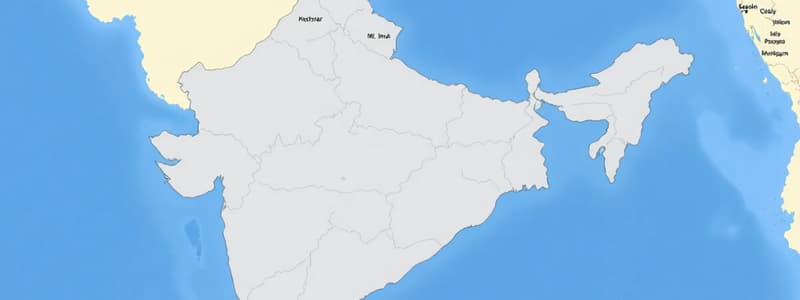Podcast
Questions and Answers
What is the primary focus of the content provided?
What is the primary focus of the content provided?
Which of the following best describes the format of the content?
Which of the following best describes the format of the content?
What kind of information is notably absent from the content?
What kind of information is notably absent from the content?
How can the engagement level of the content be assessed?
How can the engagement level of the content be assessed?
Signup and view all the answers
Which statement is accurately inferred from the content structure?
Which statement is accurately inferred from the content structure?
Signup and view all the answers
Study Notes
General Information
- The provided images contain various texts, including greetings, subject matter for a geography course, and questions.
- The content spans multiple pages, covering topics such as public expenditure and revenue, the land of diversities in India and its resources, consumer rights and protection, and various geographic features and aspects.
Public Expenditure and Public Revenue
- Public expenditure refers to the money spent by the government for public welfare activities.
- Public revenue is the government's income.
India: The Land of Diversities
- India is a diverse country, with many different cultures, regions, and resources.
- The Himalayas act as a great wall, and are divided into Trans Himalayas, Himalayas, and Eastern Himalayas.
- Sub-regions within the Himalayas include Karakoram, Ladakh, and Zaskar.
- The Eastern Himalayas include Patkai Bum, Naga Hills, Garo, Khasi, Jaintia, and Mizo Hills.
- The Himalayas have the highest peak in India, K2 (8661m).
- The Himalayas are arc-shaped and approximate 2400 km long and Mount Everest, the highest peak in the world, is in the Himalayas.
- The Eastern Highlands are located at an altitude of 500 to 3000 meters and are known as Purvachal.
- Cherrapunji is known for high rainfall.
- Soil in northern mountain regions is fertile mountain soil.
- Major Himalayan rivers include the Indus, Ganga, and Brahmaputra.
- The Indus originates from Manasarovar and empties into the Arabian Sea.
- The Ganga originates from Gaumukh in the Gangotri glacier and flows into the Bay of Bengal.
- The Brahmaputra originates from Chema-Yung-Dung glacier in Tibet (in India only 725 km of the river flows). It empties into the Bay of Bengal.
Consumer: Satisfaction and Protection
- Consumption is satisfying human needs using goods and services.
- A consumer is a person who buys and uses goods and services by paying or agreeing to pay a price.
- Consumers expect quality and reliability.
- After-sale services are also important for consumer satisfaction.
- Exploiting customers happens in many forms, such as selling low quality products, adulteration, charging excessive prices, manipulation with weights and measures, and delaying in providing services.
Other Topics
- The images show various types of taxes, including direct taxes (e.g., income tax) and indirect taxes (e.g., Goods and Services Tax - GST).
- The GST was implemented on July 1, 2017. The classifications of GST are Central GST (CGST) and State GST (SGST) and an Integrated GST (IGST).
- Other sources of government revenue include fees, fines, penalties, grants, profits, and loans.
- Budget categories include balanced, surplus, and deficit budgets.
- Types of budgets include balanced, surplus, and deficit budgets.
- Geographical factors for rice and wheat cultivation are detailed in separate sections.
- Advantages of non-conventional energy sources are presented.
- Different transportation methods like roads, railways, and water transport are included.
- Major ports in India are listed.
Studying That Suits You
Use AI to generate personalized quizzes and flashcards to suit your learning preferences.
Related Documents
Description
Test your knowledge on India's diverse geography, including the Himalayas and its sub-regions, alongside concepts of public expenditure and revenue. This quiz covers essential geographical features and the government's role in public welfare. See how much you know about these important topics!




